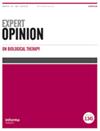用于治疗滤泡性淋巴瘤的莫苏尼珠单抗。
IF 3.6
3区 医学
Q2 BIOTECHNOLOGY & APPLIED MICROBIOLOGY
引用次数: 0
摘要
导言滤泡性淋巴瘤(FL)是一种非霍奇金淋巴瘤,其自然史中复发和难治性呈进行性增加,中位生存期约为18-20年。抗 CD20 单克隆抗体的出现改变了 FL 的治疗算法,提高了无进展生存期。在这篇综述中,我们以 "mosunetuzumab "和 "滤泡性淋巴瘤 "为关键词,从主要数据库(PubMed、Medline、Medscape、ASCO、ESMO)中选取了2021年1月至2024年6月期间的论文,概述了mosunetuzumab-axgb--一种开创性的BsAb。专家观点mosunetuzumab可产生T细胞介导的细胞毒性,并允许阶梯用药,从而减少细胞因子释放综合征等不良反应,而且耐受性良好。与此同时,它还能在不断变化的FL治疗中改善疗效,即使是CAR-T后FL患者也不例外。预后因素和可靶向的耐药机制有待探索。本文章由计算机程序翻译,如有差异,请以英文原文为准。
Mosunetuzumab for the treatment of follicular lymphoma.
INTRODUCTION
Follicular lymphoma (FL) is an indolent non-Hodgkin lymphoma that shows a progressive increase in relapses and refractory in its natural history, and a median survival of approximately 18-20 years. The advent of anti-CD20 monoclonal antibodies has changed the FL therapeutic algorithm, with an increase in progression-free survival. T-cell-dependent bispecific antibodies (BsAbs) represent an emerging drug class against FL.
AREAS COVERED
In this review, we selected papers from the principal databases (PubMed, Medline, Medscape, ASCO, ESMO) between January 2021 and June 2024, using the keywords 'mosunetuzumab' and 'follicular lymphoma' to provide an overview of mosunetuzumab-axgb, a pioneering BsAb. Its mechanism of action, efficacy, safety and future perspectives were analyzed.
EXPERT OPINION
mosunetuzumab grants a directing T-cell mediated cytotoxicity and allows a step-up dosing that reduces adverse events, such as cytokine release syndrome, with promising tolerability. At the same time, it improves outcomes in the evolving landscape of FL management, even in post-CAR-T FL patients. Prognostic factors and targetable mechanisms of resistance need to be explored.
求助全文
通过发布文献求助,成功后即可免费获取论文全文。
去求助
来源期刊

Expert Opinion on Biological Therapy
医学-生物工程与应用微生物
CiteScore
8.60
自引率
0.00%
发文量
96
审稿时长
3-8 weeks
期刊介绍:
Expert Opinion on Biological Therapy (1471-2598; 1744-7682) is a MEDLINE-indexed, international journal publishing peer-reviewed research across all aspects of biological therapy.
Each article is structured to incorporate the author’s own expert opinion on the impact of the topic on research and clinical practice and the scope for future development.
The audience consists of scientists and managers in the healthcare and biopharmaceutical industries and others closely involved in the development and application of biological therapies for the treatment of human disease.
The journal welcomes:
Reviews covering therapeutic antibodies and vaccines, peptides and proteins, gene therapies and gene transfer technologies, cell-based therapies and regenerative medicine
Drug evaluations reviewing the clinical data on a particular biological agent
Original research papers reporting the results of clinical investigations on biological agents and biotherapeutic-based studies with a strong link to clinical practice
Comprehensive coverage in each review is complemented by the unique Expert Collection format and includes the following sections:
Expert Opinion – a personal view of the data presented in the article, a discussion on the developments that are likely to be important in the future, and the avenues of research likely to become exciting as further studies yield more detailed results;
Article Highlights – an executive summary of the author’s most critical points.
 求助内容:
求助内容: 应助结果提醒方式:
应助结果提醒方式:


